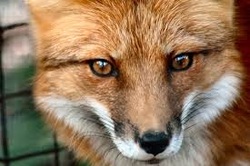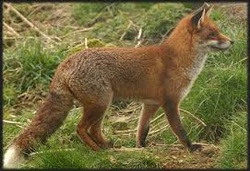 www.treknature.com
www.treknature.com The animals that first settled into United Kingdom towns and cities as far back as the 1940s have increased to an estimated 33,000. There are thought to be 16 foxes per square mile in London alone. In rural areas, the fox can live for up to 15 years, but life expectancy in urban areas is much shorter and most only survive for about two to three years, with cars responsible for the majority of deaths.
Many people dislike urban foxes, blaming them for biting babies and killing penguins at London Zoo. However, I've often read about others feeding them and treating them like pets.
Dealing with UK urban foxes is complicated. They are protected under a series of wildlife laws and it is only permissible to control numbers in very limited ways. Even then methods such as shooting often aren't appropriate in urban areas.
But there are a small number of experts specializing in dealing with them in ways that will not harm the animal. The humane deterrence squad are getting up to 50 calls a week from people who need help but don't want the fox harmed.
A fox's territory can cover up to 40 acres and in urban areas can include up to 400 gardens. Apparently, killing foxes is pointless in urban areas because another one will quickly take its place when they notice the scent mark is gone. The humane approach is about disturbing a fox's normal behavior and, crucially, moving it to another part of its territory. This means its scent will still be left around the area so no other foxes will move in. You'd have to ask the experts about their method of ensuring the fox remains in their new accommodation.
 www.new-forest-national-park.com
www.new-forest-national-park.com Britain has some of the highest-density fox populations in the world but they cause remarkably few problems. There are many benefits of having foxes in urban areas, including being nature's pest controllers when it comes to rats and feral pigeons.
Human beings can't exist in isolation. A large colony of wasps has lived inside our roof for the last few years. They don't pose a threat to us, and play an important role in reducing the numbers of flies as well as pollinating crops. We live together in peace. Considering the harmonious workings of nature, foxes play an important part in the whole too. If we continue taking out what we don't like: squirrels, foxes, and badgers, we will lose everything else that contributes to the ecosystem.

 RSS Feed
RSS Feed






